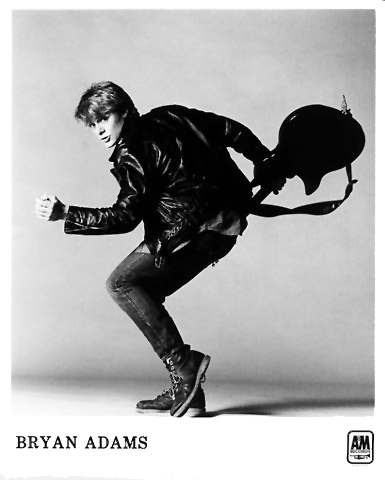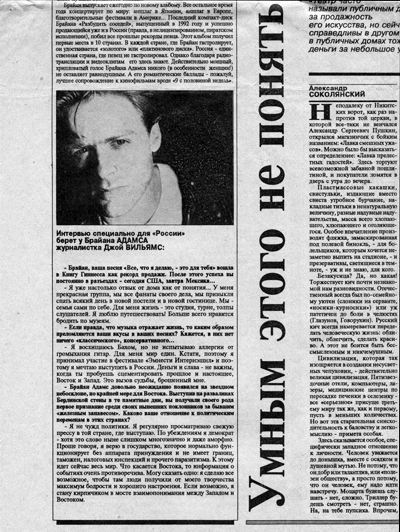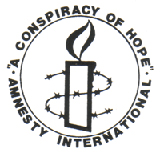
| Search JoyZine with Google Site Search! |
|
Bryan Adams
Interview by Frank Andrick
I think it's important that people know that every song from no matter who doesn't necessarily end up where you'd like it to go. For better or worse.
Adams rose to fame in North America with his album Cuts Like a Knife and turned into a global star with his 1984 album Reckless. In 1991, he released his popular Waking Up the Neighbours album, which included "(Everything I Do) I Do It for You", one of the best-selling singles of all time. For his contributions to music, Adams has garnered many awards and nominations, including 20 Juno Awards among 56 nominations, 15 Grammy Award nominations, including a win for Best Song Written Specifically for a Motion Picture or Television in 1992. He has also won MTV, ASCAP, American Music awards, two Ivor Novello Awards for song composition, and has been nominated for several Golden Globe Awards and three times for Academy Awards for his songwriting for films. Adams was awarded the Order of Canada and the Order of British Columbia for contributions to popular music and philanthropic work via his own foundation, which helps improve education for people around the world. Adams was inducted into the Hollywood Walk of Fame in March 2011 and Canada's Walk of Fame in 1998, and in April 2006 he was inducted into the Canadian Music Hall of Fame at Canada's Juno Awards. In 2008, Bryan was ranked 38 on the list of All-Time Top Artists by the Billboard Hot 100 50th Anniversary Charts. On 13 January 2010, he received the Allan Waters Humanitarian Award for his part in numerous charitable concerts and campaigns during his career, and on 1 May 2010 was given the Governor General's Performing Arts Award for his 30 years of contributions to the arts. And yet, I found Bryan Adams to be a nice, down-to-earth but very interesting guy when I interviewed him by phone from my home in San Francisco. Q: Where and how do you write songs? Is touring conducive to songwriting? Bryan: I usually don't write songs on the road. Oh, I get ideas, riffs, things like that, which I keep around. I've got one of those PortaSound studios, so I can demo stuff really quick, just to keep the ideas so I can work on them later. Sometimes we might even work on stuff during rehearsals or soundchecks. During breaks in the touring schedule, I take a week or two off here and there, and you can usually find me working on on a few things. Some of it can be worked out on the road but most of the time it's the quiet times when you've had some time for ideas, pieces of music, words, whatever to sort of kick around. That's when I really start to write and put things together. So we go into the studio with all kinds of angles on material. Some of it has come from bits and pieces on the road, some are demoed songs from working with the band, especially some songs that need a chorus or a couple of verses, or things like, "How does this work as an opening riff?" "Where do we go from here?" "What fits?" I like to be as spontaneous as possible, allowing for the studio situation. Some songs are written in the studio, put together on the spot, often times while something completely different is going on in the main control room. I think going into the studio itself is very inspiring. And then of course everything you need is there—the machines, the musicians, that kind of expectant atmosphere, what you feel from doing things together with a good band—it's all there. "(Everything I Do) I Do It for You" was written in that fashion. In the studio it was one of the easiest songs I've ever written and performed. It did really just fall together. Just like in the stories you read about other people. (laughs) Just like in the movies.
Q: Talking about movies, how about those movie soundtracks? What comes first, the music or the movie? Bryan: Oh, that happens in every way imaginable! There have been producers, movie producers, who have sought me out to contribute to a soundtrack, and there have been movies I've wanted to place a song on. People send me scripts and ask if I'm interested. I've also sent songs in that have later on been rejected. I think it's important that people know that every song from no matter who doesn't necessarily end up where you'd like it to go. For better or worse. I like having songs on soundtracks. It can go well, so that the music and the movie can both add to each other, enhance each other. Of course, the promotional and marketing are also there, the tie-ins, and the greater exposure of a hit song and a hit movie. But I don't really see myself as a person who does movie soundtracks. Essentially, I'm a singer-songwriter with a great rock and roll band to back me up. The movie thing is not so important to us as putting on on a good show, making a great record. Maybe someday I could see myself scoring a film, but it's not going to happen in the near future. It's certainly not on the horizon, it would take too much time right now. Besides, I feel there are a lot of people—like Peter Gabriel and others—who are much better at that sort of thing. It happens, but I don't think about it too much, though I'm really grateful for the exposure. In the end, it's not really what we do as much as it is someone finding a place where the music can be used. Q: Let's segue from movie producers to record producers. You've run the gamut from Bob Ezrin [Lou Reed, Alice Cooper, Kiss, Pink...] to self-producing, which won you a Juno Award for Cuts Like a Knife, to Robert "Mutt" Lange [AC/DC, Def Leppard, Foreigner, The Cars, Maroon 5, Nickelback...]. After such a wide range of producers, what—or who—do you find works best for Bryan Adams? Bryan: All of the above! Seriously, in their time and with the right material any approach will work. If you want a certain producer... most likely the producer you want is busy because he's good. Just the factor of scheduling time can make working together possible or not. I was fortunate to work with Robert Lange on Waking Up the Neighbours. Time allowed for it and I like the kind of rock and roll sound he gets—his distinction between instruments and the power that he captures. He's also easy to work with, which is important—a producer who comes in with ideas and yet is secure enough to be spontaneous, to run with a feeling, try something new and get a foundation in his methods, have the ability to keep it all straight. We had Bob Clearmountain [Bruce Springsteen, The Rolling Stones, Bon Jovi, Simple Minds...], a producer in his own right, as an engineer. With the band that I have it worked out as a great combination. Q: It certainly turned out a great album with record-breaking sales, with "(Everything I Do) I Do It for You" even entering the famed Guinness Book of World Records. I understand that in support of that album you embarked on a record-breaking tour. You're calling me at home tonight in San Francisco while you're in Mexico City playing a show tonight. Where do you go from there an where have you been? Bryan: We have some dates in South America, Venezuela, Brazil, some European shows that will take us into December. We'll be playing in Prague, which is a first for us. It really has been a world tour for quite awhile, almost two years. We've crisscrossed Canada and the United States, played over in Japan, New Zealand, Australia, we've been back and forth to Europe on many different legs of this tour. A lot of large, outdoor festivals in Europe during the summer, all over Greece Italy, Austria—most of the television rock shows over there. We're going home for the holidays. I'll finally go home after 18 months on the road. Q: Eighteen months out touring! You must be glad to be going home at last... Bryan: Uh... Well, not really... I don't really remember what home is like. I mean, after 18 months out I've gotten into the habit of touring, into the actual fun of touring. I have a great band, we're all friends, the crew is great, it's really gotten to be family, all those clichés are really true for us. We do this a lot, obviously we know how to pace ourselves, and this is what we want, what I want to do. I love writing and recording a lot but what I love best is playing for people. Q: During those one- or two-week breaks you take between continents on your global tours, besides maybe writing a song or two, what do you do with yourself? Bryan: I know it sounds crazy but I like to travel! Go someplace where maybe I haven't been to with the band, or a place that I felt I haven't had time to spend in properly because of tour commitments, not enough free time or whatever. I should tell you that on one of my last vacations I went to St. Petersburg [Russia] for a few days. Q: I was aware that you had been to Moscow, when you played for over 250,000 people at an awards show that was broadcast via satellite all over the world, but I was not aware that you'd vacationed in St. Petersburg. What brought that on, and what did you do there? Bryan: I've wanted to go there for some time, and finally I had a week off, so we made the arrangements and went right over. It was fantastic! At night it's one of the most beautiful places I've ever been—the churches, street lamps... it's really a place where the old has been preserved. I went mainly to see the art museums, where I was lucky enough to spend two days just taking advantage of the opportunity to take in such images. Q: That's wonderful! You're the first person I've known to actually go over for such a purpose and the first [I've known] to have seen all those works. St. Petersburg is often described by locals as the Gorod Muzei—the museum city. Peter the Great founded the city's first museum, the extraordinary Kunstkammer, for the edification his subjects, and the city now boasts over 100 museums, including the vast Hermitage, one of the world's most famous galleries. And due to the connections and art diplomacy of Sergei Diaghilev, the Russian art critic, patron, ballet impresario and founder of the Ballets Russes, the museums have incredible collections of 19th century and early 20th century art—from the expressionist and impressionist ranks, the early constructivists and of course the Chagals and Kandinskys left in their homeland when they emigrated. What did you spend the most time with?
Bryan: It's really hard to say because it's so overwhelming and you have so little time, really. There are so many masterpieces that you're always wondering what's around the next corner that's going to blow you away. The expressionist works are great, of course. You find yourself at a loss for words trying to encapsulate it all. Words don't do it justice, you have to be there. It's like the British Museum or the New York Met or the Louvre or such. If it has any impact on you at all, you end up walking out of there unable to speak. The impressionist galleries are really stunning. When you actually confront those painting it's... well, it was one of my best vacations ever. Another aspect of art there are the Russian orthodox religious and icon paintings, some in museums and many in churches, which are just fabulous, gold encrusted with jewels both massive and incredibly detailed. It's an amazing place. Everyone was very kind to us. I would really love to play there again and have some time off for myself, too. I know I just scratched the surface in my first trip there. Q: In addition to your global broadcast from Moscow and the concert that you were involved in at the Berlin Wall recreating Pink Floyd's concept extravaganza The Wall with Van Morrison and others. And, you participated in the Amnesty International tour with U2, Sting and Bryan Adams, Peter Gabriel, Lou Reed, Joan Baez, and others. Looking back at the changes in the world since those three historic musical monuments to freedom, what changes, if any, do you think you had upon the prevailing world situation?
Bryan: Wow! I'm not really sure that any could be directly attributed to my work. There have been so many different factors and huge shifts of economies, idealogies, the needs and want of entire peoples. First off, I only played some of the six Amnesty International shows in the U.S.—San Francisco, Los Angeles, Atlanta and New York, so my involvement was minimal compared to many others'. Although the Berlin Wall did come down in the end, it came down more from its own oppressive weight than anything I might have have done in playing there, though I don't want to minimize doing things, and getting involved on many different levels is very important. The Amnesty International symbol of a solitary candle in the darkness is very appropriate. One light can and does light a world. I think these shows heighten awareness of situations, they draw attention and bring focus and raise funds, but they are essentially rock and roll shows. The real work is done in the trenches, so to speak, by people and between people that you or I will probably never know. Q: Why don't we end this interview on that high note and perhaps a message to the people of Russia and the world, as this interview will be translated and broadcast in Russian and English via AM/FM and satellite throughout Russia and the world. What would you like to say in closing, Bryan? Bryan: First, thank you, Frank, for giving me this opportunity, and, yes, I would like to say something to everyone out there. I would like to thank everyone for listening to my music and for giving me and my band a place in their lives. I look forward to playing in Russia again in the future, and hope that we will all have a chance to get together. I would like to say hello to the people whom I have met throughout my travels in your countries. Thank you for your kindness and support and may we meet again in the better days ahead that we will all help bring about. |



